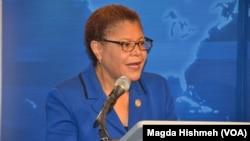Interview with Congresswoman Karen Bass, Ranking Member of the Foreign Affairs Sub-Committee on Africa.
United States Congresswoman Karen Bass of the 37th Congressional District in California, travelled to Zimbabwe recently to observe the nation’s July 30th harmonized elections. Congresswoman Bass was part of the observer mission organized by the National Democratic Institute and the International Republican Institute, which also comprised former Liberian President and Nobel Peace Prize laureate Ellen Johnson Sirleaf, former Interim President of the Central African Republic Catherine Samba-Panza, former U.S. Assistant Secretaries of State for African Affairs, Connie Berry Newman and Ambassador Johnnie Carson.
Congresswoman Bass said she was impressed by the 85% turnout for the crucial elections, but disappointed by the post-election violence, that she said marred an otherwise well-organized and peaceful election. Commenting on the follow up to the inauguration of President Emmerson Mnangagwa, Congresswoman Bass said opposition leader Nelson Chamisa of the MDC Alliance has to accept the outcome of the election, and push to win the next elections in 2023. In an interview with Gibbs Dube of VOA’s Zimbabwe Service, Congresswoman Bass said she wants to see a Zimbabwe where the rights of all citizens are protected, and the opposition given room to hold peaceful protests, as guaranteed by the constitution.
Gibbs Dube (GD): You were part of a joint observation mission to Zimbabwe organized by the International Republican Institute and the National Democratic Institute. What were your key findings?
Congresswoman Bass (Cong. Bass): My key findings was that the process appeared to be very well organized, it was peaceful. I will tell you that I was envious of an 85% turnout in an election which I certainly have not seen in the United States. And everything went really well. The problem was the days after the election and I left two days after, and you know of course that the opposition rejected the results, and felt that the counting was not accurate, especially the transmission of the results from the polling place, and you know that the (Constitutional) Court ruled in favor of the election results. So I think that that was a very sad outcome to what looked like a very well organized and peaceful process. But obviously if you have a large percentage of the population that is not happy with the results, then I am concerned for what will take place in Zimbabwe in the near future.
GD: Now the opposition says it is not recognizing Mr. Mnangagwa as president. What is your view on that?
Cong. Bass: Well I think that’s a very difficult thing. The courts have ruled, that is the process, and so to not recognize him as president, I don’t know what that means. He is the president, and so I am hoping that they will respond in a peaceful manner and that they will be the peaceful opposition. They did win seats in parliament, they are in parliament, they are part of the government.
GD: So looking at the way things are going, you know, Mr. Nelson Chamisa of the MDC Alliance is saying no, you know, he’s the legitimately-elected president of Zimbabwe and he is digging into his trenches. So what’s the way forward for Zimbabwe?
Cong. Bass: Well again, I hope the way forward is peaceful opposition. I mean look, look at our situation here. I don’t like our current president and we had a very messy process here in the United States and many people questioned the legitimacy. But he is the president and as long as he is the president, you know I can say I don’t want him to be the president all day long, but I am a member of Congress and I function as part of government and he’s the president. And I am hoping that we’ll be able to change that in 2020 if not before.
GD: Now with the argument that is being brought forward by Mr. Chamisa, he’s saying he actually got 2.6 million votes against Mr. Mnangagwa’s 2 million somewhere there. So now as far as he is concerned, he says he won the election and therefore he is the president of Zimbabwe. So now, what advise can you give him?
Cong. Bass: My advice would be for him to continue to participate as a member of parliament, to expand and organize his base and to run for the presidency again in the next election.
GD: Now looking at another issue, we know that the Zimbabwe Democracy and Economic Recovery Amendment Act (ZIDERA) was actually updated. It lays out this framework of improving bi-lateral relations between the U.S. and Zimbabwe. What’s your take right now since Zimbabwe’s election?
Cong. Bass: Well, whether or not we remove sanctions and we move forward in our relations, is going to be how the government responds. So I do want Chamisa to be a loyal opposition but what I don’t want to see, is I don’t want to see the government commit human rights abuses. And I don’t want to see them arrest, incarcerate and attack the opposition. So both sides have to maintain peace. And if peace is maintained and the opposition is allowed to function as a legitimate opposition, then the United States should examine our relation with Zimbabwe, and see how we move forward.
GD: As the Ranking Member of the (Foreign Affairs) Subcommittee on Africa, what would you recommend to the U.S. government in terms of relations with Zimbabwe?
Cong. Bass: What I would recommend is that we monitor the situation, we continue to stay engaged, and we encourage the government to respond to the opposition in a peaceful manner and we encourage the opposition to protest, to be vocal, but to do it in a peaceful manner.






